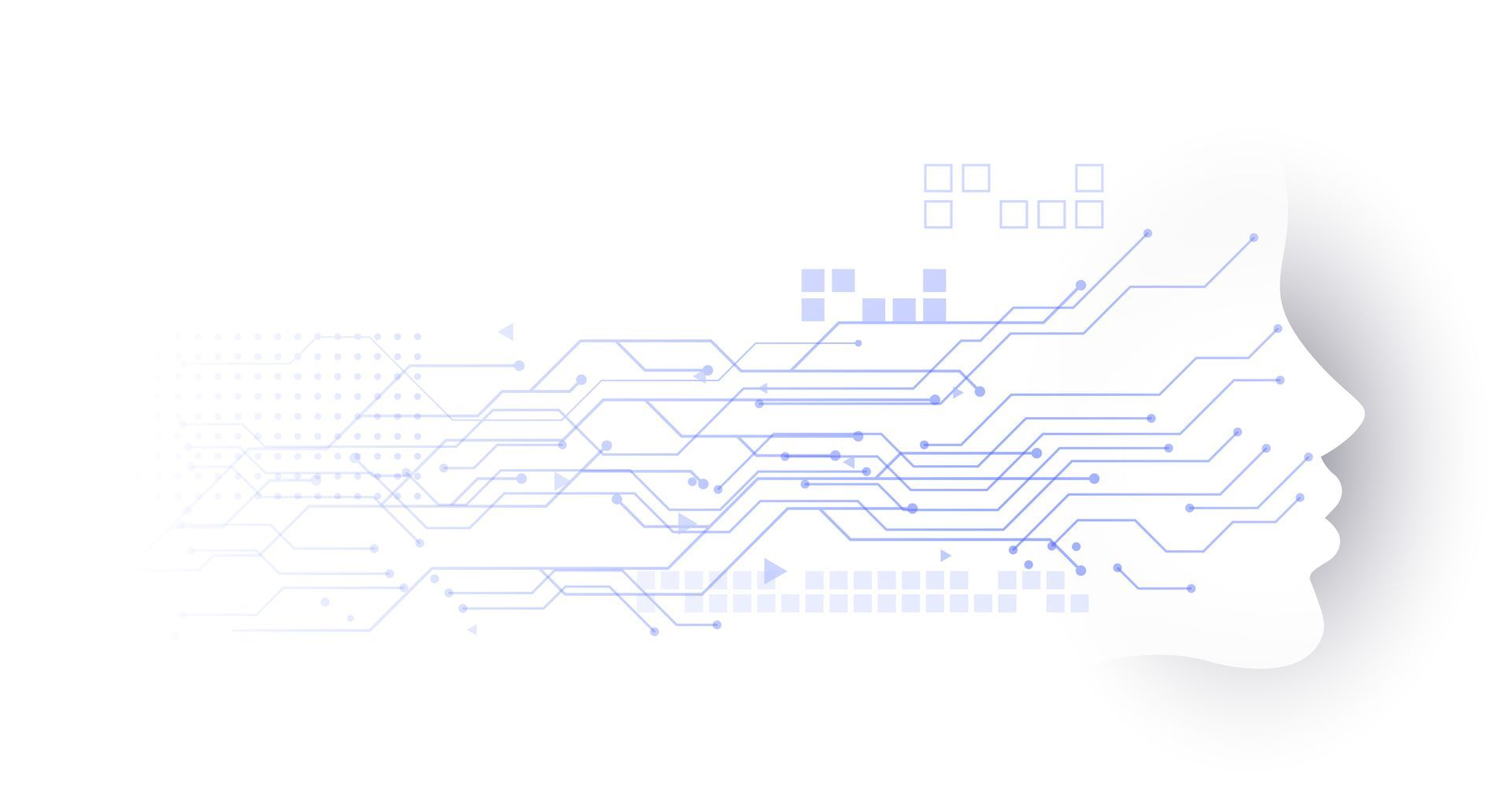Diving into the artificial future, we encounter a range of difficulties in artificial intelligence that shape its fascinating landscape.
Artificial Intelligence (AI), with its promise of enabling machines to mimic advanced human functions, has ushered in breakthroughs across various sectors. From healthcare to transportation, finance to education, AI holds the potential to revolutionize how we live and work. At its pinnacle, AI systems excel in speed, scale, and accuracy, liberating resources and time for human endeavors.
However, amidst AI enthusiasm, significant difficulties in artificial intelligence loom. There are many problems that are slowing down and sometimes even completely halting the progress of these developments, which are referred to as the technology of the future. So is AI helpless or will the power of technology once again change our lives completely? If you want to understand and question this instead of seeing it in time, you are in the right place.

What are the most common difficulties in artificial intelligence?
As AI continues to make remarkable strides, it becomes evident that its current successes are accompanied by a series of limitations and shortcomings that temper its progress.
Despite the advancements achieved, AI grapples with genuine comprehension, emotional intelligence, and the ability to make context-dependent decisions.
These difficulties in artificial intelligence show a glimpse into the intricacies of AI development, highlighting the need for continuous refinement and innovation.
Ethical dilemma of AI
As artificial intelligence penetrates deeper into the fabric of our lives, ethical dilemmas emerge as a crucial concern. The profound impact of AI on society prompts considerations about privacy, bias in decision-making, and the potential for these technologies to inadvertently exacerbate existing social inequalities. The integration of AI into critical decision-making processes underscores the importance of a thoughtful approach to ethics, ensuring that the benefits brought about by AI are accompanied by a keen sense of responsibility.
AI systems also lack emotional intelligence. They cannot understand or respond to human emotions, which can be a barrier to effective communication and collaboration. This is especially important in domains such as healthcare and customer service, where empathy and understanding are essential.
Context-dependent decision-making
One of the most important difficulties in artificial intelligence is its limitations of context. AI systems are often trained on large datasets of data, but this data may not be representative of the real world. This can lead to AI systems making decisions that are not appropriate for the specific context.
For example, an AI system that is trained on data from a developed country may not be able to make accurate predictions about the needs of people in a developing country.

Data dependency
AI systems rely on large amounts of data to learn and make decisions. However, not all data is created equal. Data that is biased, incomplete, or inaccurate can lead to AI systems that make poor decisions. This is why it is important to carefully curate the data that is used to train AI systems. After all, databases are the unsung heroes of AI.
Transparency and explainability
The “black-box” nature of some AI algorithms makes it difficult to understand how they make decisions, creating an important matter to put on difficulties in artificial intelligence list. This can be a problem in domains where trust and transparency are essential, such as healthcare and finance. There is a growing movement to make AI algorithms more transparent and explainable, so that users can better understand how they work.
Workforce transformation
Although not directly on the list of difficulties in artificial intelligence, AI is changing the workforce, with some jobs being automated and new jobs being created. This can lead to job displacement and uncertainty for workers. It is important to develop policies and programs to help workers transition to new jobs and skills.
Regulation and governance
Regulation of any technology is important and in this case, it is one of the most important difficulties in artificial intelligence it has to overcome. AI is a powerful technology that has the potential to be used for good or for bad. It is important to develop regulations and governance frameworks that ensure that AI is used responsibly and ethically. This is a complex challenge that will require international cooperation.
Technical complexity
Developing and maintaining AI systems is technically complex. This is due to the large amounts of data that are needed, the complexity of the algorithms, and the need for specialized skills. The shortage of AI experts is a major barrier to the development and deployment of AI systems, ultimately adding one more bullet to difficulties in artificial intelligence.

Is it all hopeless for AI?
Artificial intelligence (AI) stands at the forefront of technological advancement, promising to reshape industries, revolutionize problem-solving, and enhance our daily lives. However, this journey is not without its hurdles. The multifaceted challenges inherent in AI development demand a comprehensive and collaborative approach to overcome them. While each challenge presents its own complexities, a combination of strategic approaches, collaborative efforts, and continuous innovation is key to charting a path forward.
AI’s current successes are juxtaposed with its limitations in grasping complex nuances, understanding emotions, and making contextually informed decisions. To overcome these limitations, significant investments in research and development are necessary. These endeavors should focus on improving AI’s comprehension abilities, enhancing emotional intelligence, and refining decision-making processes. Moreover, embracing the concept of hybrid intelligence, which melds human expertise with AI capabilities, can bridge the gap where AI falls short.
AI has many obstacles in its way
As mentioned before, ethical considerations are one of the biggest difficulties in artificial intelligence to overcome. As AI becomes increasingly integrated into our lives, ethical considerations come to the forefront. Issues related to privacy, bias in decision-making, and the potential amplification of social inequalities demand proactive measures. Embedding ethics into AI design is crucial. The concept of “ethics by design” ensures that ethical considerations are an integral part of AI development from its inception. Furthermore, involving a diverse range of stakeholders, including ethicists, policymakers, and affected communities, in shaping AI ethics can lead to more comprehensive and balanced outcomes.
The foundation of AI’s effectiveness lies in the datasets it learns from. However, the challenge lies in ensuring the quality, relevance, and fairness of these datasets. To address this, rigorous data quality assurance processes need to be established. Additionally, fostering collaborations for sharing relevant and diverse datasets can enhance AI’s training outcomes. These collaborations promote a collective effort to overcome data-related challenges and drive AI’s progress.
The “black-box” nature of certain AI algorithms raises concerns about the transparency and accountability of AI decisions. Developing interpretable AI models that offer insights into the decision-making process can enhance user trust and understanding. Auditing tools that can scrutinize AI decisions and provide explanations for their outcomes contribute to enhanced transparency and accountability in AI systems.
AI’s rise brings about concerns of job displacement. Navigating this transformation requires proactive policies and comprehensive retraining efforts. Investing in education and reskilling programs can equip the workforce with skills that complement AI technologies. Facilitating job rotation and upskilling initiatives helps workers transition into roles that align with AI advancements, ensuring a seamless integration of AI and human expertise.

Another one on the list of difficulties in artificial intelligence is regulation. Striking a balance between innovation and regulation is a complex challenge governments and policymakers must navigate. Adaptive regulatory frameworks that can evolve alongside AI’s rapid progress are essential. Cross-border collaboration is also pivotal in establishing consistent global standards for AI governance. This collaborative approach ensures that AI’s benefits are harnessed while its potential risks are mitigated.
The intricacies of developing and maintaining AI systems are undeniable. A shortage of AI experts further exacerbates this challenge. Addressing this requires an investment in comprehensive training programs to cultivate a skilled workforce capable of designing, developing, and maintaining AI systems. Exploring AI-driven solutions that automate maintenance tasks can alleviate the burden on human experts, ensuring the continued functionality of AI systems.
As we navigate these difficulties in artificial intelligence, it’s essential to recognize that they are not insurmountable roadblocks but opportunities to catalyze innovation. A comprehensive and collaborative approach that engages technologists, policymakers, ethicists, and society at large is imperative. By harnessing the collective expertise and leveraging strategic initiatives, we can collectively shape a future where AI’s potential is realized responsibly, enhancing human experiences and driving progress in a world increasingly defined by technology.
The future of artificial intelligence is bright
The future of artificial intelligence (AI) holds transformative potential across various dimensions. AI’s rapid evolution has impacted society over the last five years, and its influence is set to grow further in the coming years. AI’s ability to process vast amounts of data and make optimized decisions has revolutionized industries and technological advancements. The integration of AI, particularly “narrow AI” or machine learning, has already left an indelible mark on numerous sectors. The next decade could witness significant advancements driven by AI.
Key areas of AI’s future include the development of artificial general intelligence (AGI), where machines exhibit human-level intelligence and problem-solving abilities. Discussions surrounding AGI’s potential impact on humanity range from optimistic applications to cautionary concerns about ethics and control. Looking ahead, AI’s growth will likely continue to revolutionize industries, enhance decision-making processes, and present both opportunities and challenges for society. This transformation is expected to influence the way businesses operate, the skills required in the job market, and the ethical considerations surrounding AI’s integration into daily life.
As AI technologies advance and become increasingly integrated into our lives, thoughtful consideration, collaboration, and ethical frameworks will play pivotal roles in shaping the AI landscape and its impact on society.
Featured image credit: kjpargeter/Freepik.






